- Clone
- 12G5 (See other available formats)
- Regulatory Status
- RUO
- Workshop
- VII 70204
- Other Names
- CXCR4, Fusin
- Isotype
- Mouse IgG2a, κ
- Ave. Rating
- Submit a Review
- Product Citations
- publications
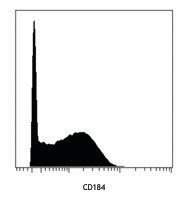
-

Human PBMCs stained with 175Lu-anti-CD184 (CXCR4) (12G5). Data provided by DVS Sciences.
| Cat # | Size | Price | Quantity Check Availability | Save | ||
|---|---|---|---|---|---|---|
| 306523 | 100 µg | 175€ | ||||
CD184, also known as fusin or CXCR4, is a 45 kD seven transmembrane G-protein-linked CXC chemokine receptor. CD184 is widely expressed on blood and tissue cells, including B and T cells, monocytes, macrophages, dendritic cells, granulocytes, megakaryocytes/platelets, lymphoid, myeloid precursor cells, endothelial cells, epithelial cells, astrocytes, and neurons, among other tissue cells. CD184 is the receptor for CXC chemokine SDF-1, mediates blood cell migration, and is involved in B lymphopoiesis and myelopoiesis, cardiogenesis, blood vessel formation, and cerebellar development. CXCR4 is also a coreceptor of X4 HIV-1 and an alternative receptor for some isolates of HIV-2.
Product DetailsProduct Details
- Verified Reactivity
- Human, Cynomolgus, Rhesus
- Reported Reactivity
- African Green, Baboon, Chimpanzee, Sooty Mangabey
- Antibody Type
- Monoclonal
- Host Species
- Mouse
- Immunogen
- CP-MAC-infected Sup-T1 cells
- Formulation
- Phosphate-buffered solution, pH 7.2, containing 0.09% sodium azide and EDTA.
- Preparation
- The antibody was purified by affinity chromatography.
- Concentration
- 1.0 mg/ml
- Storage & Handling
- The antibody solution should be stored undiluted between 2°C and 8°C.
- Application
-
FC - Quality tested
CyTOF® - Verified - Recommended Usage
-
This product is suitable for use with the Maxpar® Metal Labeling Kits. For metal labeling using Maxpar® Ready antibodies, proceed directly to the step to Partially Reduce the Antibody by adding 100 µl of Maxpar® Ready antibody to 100 µl of 4 mM TCEP-R in a 50 kDa filter and continue with the protocol. Always refer to the latest version of Maxpar® User Guide when conjugating Maxpar® Ready antibodies.
- Application Notes
-
Additional reported applications (for the relevant formats) include: immunohistochemical staining of paraffin-embedded tissue sections11, immunocytochemistry3, immunofluorescence microscopy2,6, and blocking of CD4-independent infection by HIV-2 and CD4-dependent infection by some T cell-tropic isolates of HIV-14,5. Clone 12G5 may not be suitable for Western blotting.10 The Ultra-LEAF™ purified antibody (Endotoxin <0.01 EU/µg, Azide-Free, 0.2 µm filtered) is recommended for functional assays (Cat. Nos. 306539 & 306540).
- Additional Product Notes
-
Maxpar® is a registered trademark of Standard BioTools Inc.
- Application References
-
- McKnight A, et al. 1997. J. Virol. 71:1692.
- Endres MJ, et al. 1996. Cell 87:745. (Immunogen, IF)
- Volin MV, et al. 1998. Biochem. Biophys. Res. Commun. 242:46. (ICC)
- Berndt C, et al. 1998. P. Natl. Acad. Sci. USA 95:12556. (Block)
- Ullrich CK, et al. 2000. Blood 96:1438. (Block)
- Murga M, et al. 2005. Blood 105:1992. (IF)
- Thompson BD. 2007. J. Biol. Chem. 282:9547. (FC) PubMed
- Isnardi I, et al. 2010. Blood 115:5026. PubMed
- Yoshino N, et al. 2000. Exp. Anim. (Tokyo) 49:97. (FC)
- Fischer T, et al. 2008. PLoS One 3:e4069.
- Schmid BC, et al. 2004. Breast Cancer Res. Treat. 84:247. (IHC)
- RRID
-
AB_2562824 (BioLegend Cat. No. 306523)
Antigen Details
- Structure
- Rhodopsin family, G-protein linked seven transmembrane glycoprotein, 45 kD
- Distribution
-
T cells and B cells, dendritic cells, monocytes, granulocytes, hematopoietic progenitors, endothelial cells
- Function
- B lymphopoiesis and myelopoiesis, cardiogenesis, blood vessel formation, cerebellar development
- Ligand/Receptor
- SDF-1 receptor, coreceptor for X4 HIV-1
- Cell Type
- B cells, Dendritic cells, Endothelial cells, Granulocytes, Hematopoietic stem and progenitors, Mesenchymal Stem Cells, Monocytes, Neural Stem Cells, T cells, Tregs
- Biology Area
- Cell Biology, Immunology, Innate Immunity, Neuroinflammation, Neuroscience, Neuroscience Cell Markers, Stem Cells
- Molecular Family
- CD Molecules, Cytokine/Chemokine Receptors, GPCR
- Antigen References
-
1. Berger E, et al. 1999. Annu. Rev. Immunol. 17:657.
2. Loetscher P, et al. 2000. Adv. Immunol. 74:127.
3. Murphy P, et al. 2000. Pharmacol. Rev. 52:145. - Gene ID
- 7852 View all products for this Gene ID
- UniProt
- View information about CD184 on UniProt.org
Related FAQs
- Does staining at room temperature or even at 37°C help for checking chemokine receptors expression?
-
Due to continuous recycling of many chemokine receptors, it may be worthwhile to consider staining at room temperature or at 37°C if the staining at lower temperature (which can potentially reduce receptor turnover) is not optimal.
- Can I obtain CyTOF data related to your Maxpar® Ready antibody clones?
-
We do not test our antibodies by mass cytometry or on a CyTOF machine in-house. The data displayed on our website is provided by Fluidigm®. Please contact Fluidigm® directly for additional data and further details.
- Can I use Maxpar® Ready format clones for flow cytometry staining?
-
We have not tested the Maxpar® Ready antibodies formulated in solution containing EDTA for flow cytometry staining. While it is likely that this will work in majority of the situations, it is best to use the non-EDTA formulated version of the same clone for flow cytometry testing. The presence of EDTA in some situations might negatively affect staining.
- I am having difficulty observing a signal after conjugating a metal tag to your Maxpar® antibody. Please help troubleshoot.
-
We only supply the antibody and not test that in house. Please contact Fluidigm® directly for troubleshooting advice: http://techsupport.fluidigm.com/
- Is there a difference between buffer formulations related to Maxpar® Ready and purified format antibodies?
-
The Maxpar® Ready format antibody clones are formulated in Phosphate-buffered solution, pH 7.2, containing 0.09% sodium azide and EDTA. The regular purified format clones are formulated in solution that does not contain any EDTA. Both formulations are however without any extra carrier proteins.
Other Formats
View All CD184 Reagents Request Custom ConjugationCustomers Also Purchased
Compare Data Across All Formats
This data display is provided for general comparisons between formats.
Your actual data may vary due to variations in samples, target cells, instruments and their settings, staining conditions, and other factors.
If you need assistance with selecting the best format contact our expert technical support team.
-
APC anti-human CD184 (CXCR4)
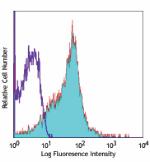
Human peripheral blood lymphocytes stained with 12G5 APC -
Biotin anti-human CD184 (CXCR4)
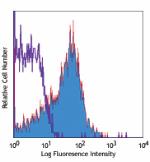
Human peripheral blood lymphocytes stained with biotinylated... -
PE anti-human CD184 (CXCR4)
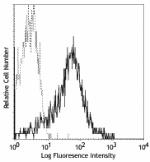
Human peripheral blood lymphocytes stained with 12G5 PE -
PE/Cyanine5 anti-human CD184 (CXCR4)
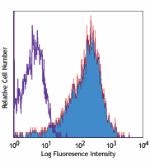
Human peripheral blood lymphocytes stained with 12G5 PE/Cyan... -
Purified anti-human CD184 (CXCR4)
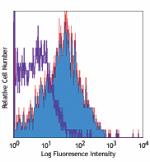
Human peripheral blood lymphocytes stained with purified 12G... 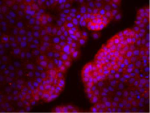
MCF7 breast cancer cell line was stained with anti-human CD1... -
PerCP/Cyanine5.5 anti-human CD184 (CXCR4)
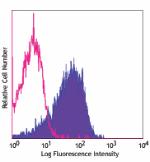
Human peripheral blood lymphocytes stained with 12G5 PerCP/C... -
PE/Cyanine7 anti-human CD184 (CXCR4)
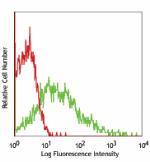
Human peripheral blood lymphocytes stained with 12G5 PE/Cyan... -
Brilliant Violet 421™ anti-human CD184 (CXCR4)
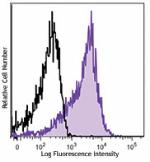
Human peripheral blood lymphocytes were stained with CD184 (... -
Brilliant Violet 605™ anti-human CD184 (CXCR4)
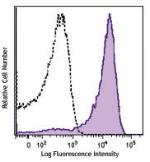
Human peripheral blood lymphocytes were stained with CD184 (... -
Purified anti-human CD184 (CXCR4) (Maxpar® Ready)
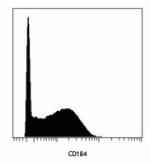
Human PBMCs stained with 175Lu-anti-CD184 (CXCR4) (12G5). Da... -
PE/Dazzle™ 594 anti-human CD184 (CXCR4)
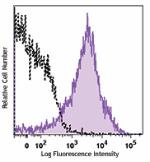
Human peripheral blood lymphocytes were stained with CD184 (... -
APC/Cyanine7 anti-human CD184 (CXCR4)
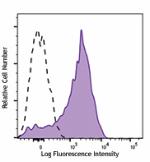
Human peripheral blood lymphocytes were stained with CD184 (... -
Brilliant Violet 785™ anti-human CD184 (CXCR4)
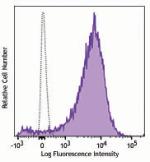
Human peripheral blood lymphocytes were stained with Brillia... -
TotalSeq™-A0366 anti-human CD184 (CXCR4)
-
TotalSeq™-C0366 anti-human CD184 (CXCR4)
-
Brilliant Violet 510™ anti-human CD184 (CXCR4)

Human peripheral blood lymphocytes were stained with CD3 FIT... -
Ultra-LEAF™ Purified anti-human CD184 (CXCR4)

Human peripheral blood lymphocytes stained with LEAF™ purifi... 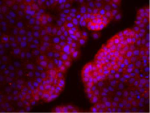
MCF7 breast cancer cell line was stained with anti-human CD1... -
APC/Fire™ 750 anti-human CD184 (CXCR4)

Human peripheral blood lymphocytes were stained with CD3 FIT... -
TotalSeq™-B0366 anti-human CD184 (CXCR4)
-
TotalSeq™-D0366 anti-human CD184 (CXCR4)
-
Brilliant Violet 650™ anti-human CD184 (CXCR4)

Human peripheral blood lymphocytes were stained with anti-hu...
 Login / Register
Login / Register 










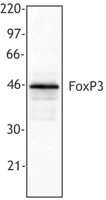
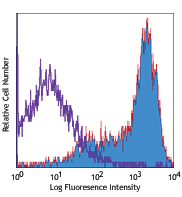
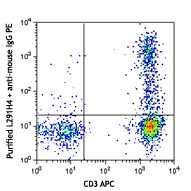
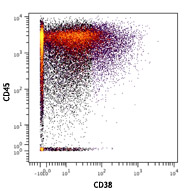



Follow Us